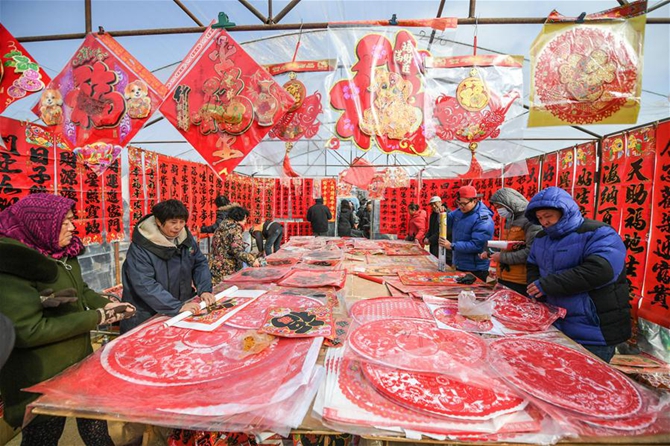Across China: Chinese celebrate kitchen god festival

People select Spring Festival goods at a grand fair in Yingkou City of northeast China's Liaoning Province, on Feb. 8, 2018, the day of Xiaonian (small year). Xiaonian falls on the 23rd or 24th day of the last month of the Chinese traditional lunar calendar, marking the start of the countdown to Spring Festival. (Xinhua/Pan Yulong)
Chinese this week celebrated the kitchen god festival, which falls one week before the Lunar New Year, or Spring Festival.
This year Spring Festival falls on Feb. 16 according to the lunar calendar. The kitchen god day, also known as the Little New Year, is celebrated on Feb. 8 in several northern regions, and a day later on Feb. 9 in southern regions.
On Thursday, local TV channels broadcast festival gala performances, and online galas were also organized.
The kitchen god, also called the "stove god," derives from ancient Chinese legends. The god is said to report the affairs of each family to the emperor of gods in heaven. However, the god can be mischievous, so people offer him food and drink, hoping that he reports good things about their family and brings back blessings for the coming new year.
On Thursday, over 400 courier drivers and their families were invited to roast duck banquets by their employers in Beijing.
Across the country, people set off fireworks to welcome the festival, which is also a prelude to the Spring Festival. Folk artists presented dance and singing performances.
For ethnic minority groups, it is also an occasion to celebrate their traditions and culture.
In northwest China's Qinghai Province, ethnic Tu people organized a contest for the best steamed buns. More than 88 families participated.
In Inner Mongolian Autonomous Region, people put on traditional robes, boiled mutton, and prepared soup to honor fire.
"Ethnic Mongolians think fire is a symbol of purity. It protects the family and the tribes," said Quugjilt, 49, from Otog Banner.
Thousands of people gathered at the mausoleum of Genghis Khan in Yijinhuoluo Banner for the festival.
According to traditional Chinese culture, the kitchen god returns from heaven on the eve of Spring Festival, so the sacrifices for the god are served until the day he returns.
In days leading up to the Lunar New Year, people clean their houses, decorate their homes with paper cuttings, couplets and written blessings, and prepare festival food.